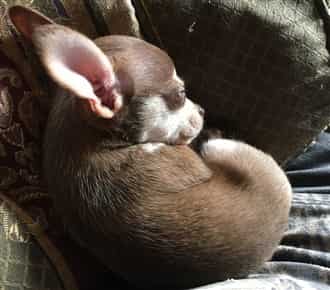Age
Chihuahua Age
Overview
In this section we are going to discuss all elements relative to Chihuahua dog age and growth including:
- The youngest age you can obtain a Chihuahua puppy and exceptions to this.
- Age milestones from birth to the senior years
- Chihuahua to human age equivalency chart
- The phases of age


Tucker, at 7 weeks old, photo courtesy of Mary Jo
Youngest Age You Can Obtain a Chihuahua Puppy
In the United States, most states have laws in regard to the age that a pup can be bought. For many, it is not legal to sell a puppy until the age of 8 weeks old.
Some states have additional guidelines, such as Kansas and Missouri that state that not only must the two-month mark be reached, the pup must also be fully weaned from the dam (mother).
There are a couple of states in the US such as Virginia and Wisconsin that dictate the puppy be no younger than 7 full weeks old.
As you can imagine, the main reason for this law is to ensure that a puppy is healthy when it leaves for its new home. Much of this is in regard to physical health, although being pulled away from dam and litter-mates at too young of an age can be emotionally taxing as well.
This said, sometimes a puppy will be a bit older before going to his new home.
There may be an instance when a breeder feels that a Chihuahua has not grown as expected and being a bit undersized, will want to wait an additional week or even a month to allow the puppy to gain a bit more weight.
If a pup is going to be transported long distance to a new home, via airplane or other means, some breeders will want the Chihuahua to be older, up to 3 months or so, to better be able to handle the physical and emotional stress that can develop during travel.
Chihuahua Age Milestones
1 day old newborn.
Puppies are born with eye lids closed, hearing is not yet developed, and deciduous (milk teeth) have not yet emerged. Newborns will only sleep and nurse.
10 days old.
Most puppies will have doubled their weight from birth. Sleep and nursing take up 95% of the pup's day.
1 month.
The beginning of a pup’s ‘socialization phase’ in which acceptance or fears are formed. The pup should be handled often and allowed to safely explore. Growth is rapid at this time. Weaning begins.
6 weeks.
Deciduous (milk) teeth start to emerge. Weaning is well-underway
and the pup is starting to do well on some solid food. First round of vaccinations are given.
2 months.
Most puppies are ready to transition to their new homes. While this is a huge adjustment, it’s an exciting time as well. A puppy of this age can become easily startled by something, but fears are still not set into place.
Part of your job as owner of a new puppy is to take advantage of a young pup’s natural curiosity and gradually introduce a wide range of elements. If so, the pup often learns to tolerate (or even enjoy) them.
This includes touching the teeth (for future dental cleanings), brushing the coat, exposure to all sorts of household noises, and introducing toys will come in handy when the teething phase begins.
The pup is being free-fed this month. A de-worming is done at 8-weeks, and a combination vaccine will be given at the 8 or 9-week mark. Housebreaking begins. The pup is sleeping a lot, 18 hours on average, with both nighttime sleep and naps. Growth is rapid at this time.
3 months.
This is the beginning of the ‘ranking phase’ in which a puppy learns his place within the hierarchy of the home. Your goal should be that your puppy sees you as the Alpha (leader) within the den (the house).
Some understanding of hierarchy will be learned just by a pup observing you and being handled and cared for. However, now is the time to make your leadership clear; if not, training of any type can be difficult and behavioral issues can arise, including territorial marking.
The pup is now eating 3 meals per day, plus 4 or 5 small dry snacks. Moist treats are given for reward. Puppy shots are complete or near complete, at which time you can start taking the puppy for twice-per-day walks and offer playtime outside in the yard (which must be supervised).
House training is still underway
but there should be progress. The pup is staying awake more now during the day and is doing better with nighttime sleep. Growth is still rapid at this time and the 3-month-old pup is exceedingly hyper.
4 months.
The ‘ranking phase’ is still underway, and lessons are being learned. The puppy is now much more aware of his surroundings. Some fears may have set in. At this age, the pup may protest being left alone more so than when he was younger. Separation anxiety issues
may develop or become stronger.
House training is near complete. Teething begins
just about now, chewing urges will be strong. Un-neutered males have viable sperm. Growth is still rapid at this time, and energy levels are high.
6 months.
This is the beginning of the adolescent stage and puberty is underway for both males and females. If not spayed, females have their first heat right around this time. Teething may be winding down somewhat while hyper puppy behavior
is decreasing; this often brings about a level of calm to the house, after things may have seemed a bit chaotic earlier. If training started at 2-months, a puppy should now be fully housebroken. Growth is slowing down.
9 months.
Most Chihuahua puppies will stop growing by the age of 9 or 10 months. For others, just a bit of weight will be gained from now until 12 months or so. Teething is complete or nearly complete.
1 Year.
A Chihuahua is deemed an adult. The 1-year-old young adult is alert, active, and wants to be kept engaged. There is, however, less hyper behavior.
1.5 Years to 9 Years.
The Chihuahua is in his or her prime.
10+ Years.
There is no exact age that a dog is declared to be a senior. Because toy breeds live relatively long lives, they become seniors later than larger breeds. The declaration that any certain dog is a senior is done by the veterinarian who is familiar with the dog’s health history. Many vets will classify a Chihuahua be a senior by age 10.
Chihuahua to Human Age Equivalency
The idea that a dog ages 7 years for every human year is a generalization. This was something put out there quite a while ago, based on the human lifespan being about 70 years, and a dog’s lifespan approximately 10. In actuality, canines will age at varying rates, with their breed size being the determining factor. Toy dogs mature much faster than larger dogs and have longer lifespans.
The rate at which a dog matures is not equal at all stages of his life. For toy breeds, there is rapid maturity growth during the first year of a 15-year equivalent, then a 9-year equivalent jump for year two, and then things even out, in increments of 4-year jumps.
Let's take a look at a Chihuahua's age equivalence to human years:
Chihuahua Years Human Years
01 1502 2403 2804 3205 3606 4007 4408 4809 5210 5611 6012 6413 6814 7215 7616 8017 8418 88
The 4 Stages and 2 Sub-stages of Maturity
If you are not sure how to refer to your Chihuahua, these are the 6 stages of maturity:
1. Newborn: Birth to 4 weeks.
2. Puppy: 4 weeks to 1 year; can be broken down into Young Puppy (4 weeks to 5 months) and Older Puppy (6 months to 11 months)
3. Adult: 1 year mark; can be broken down into Young Adult (1 to 4 years old) and Adult (5 years to 9 years)
4. Senior: 10 years and on.
Related Topics:
Senior Chihuahuas
- Even before the senior years begin, it is best to prepare for the changes that will be coming. That said, it is never too late to start. Read helpful tips for keeping older Chihuahuas happy, comfortable, and healthy.
Chihuahua Life Span
- The average life span of this breed and the top leading causes of death.
You May Also Like:
Taking Care of a Chihuahua's Paws
- This often over-looked area of the body needs to be tended to on a regular basis to avoid some of the most common issues.
Chihuahua Vaccinations
- A schedule of when shots are given, both mandatory and optional, plus possible side effects.
Best Toys for a Chihuahua
- Some of the best options to keep a Chihuahua happy and busy, plus good options for strong chewers.
Playpens for Chihuahuas
- This is the best method to keep your Chi comfortable in one defined area when you are not home or otherwise cannot supervise.
What To Do if a Bee Stings Your Chihuahua
- Toy breeds can have fast allergic reactions or toxic overload. Learn how to react to bees and other stinging insects.
We are a participant in the Amazon Services LLC Associates Program, an affiliate advertising program designed to provide a means for us to earn fees by linking to Amazon.com and affiliated sites.
Email: Contact@PetChiDog.com


